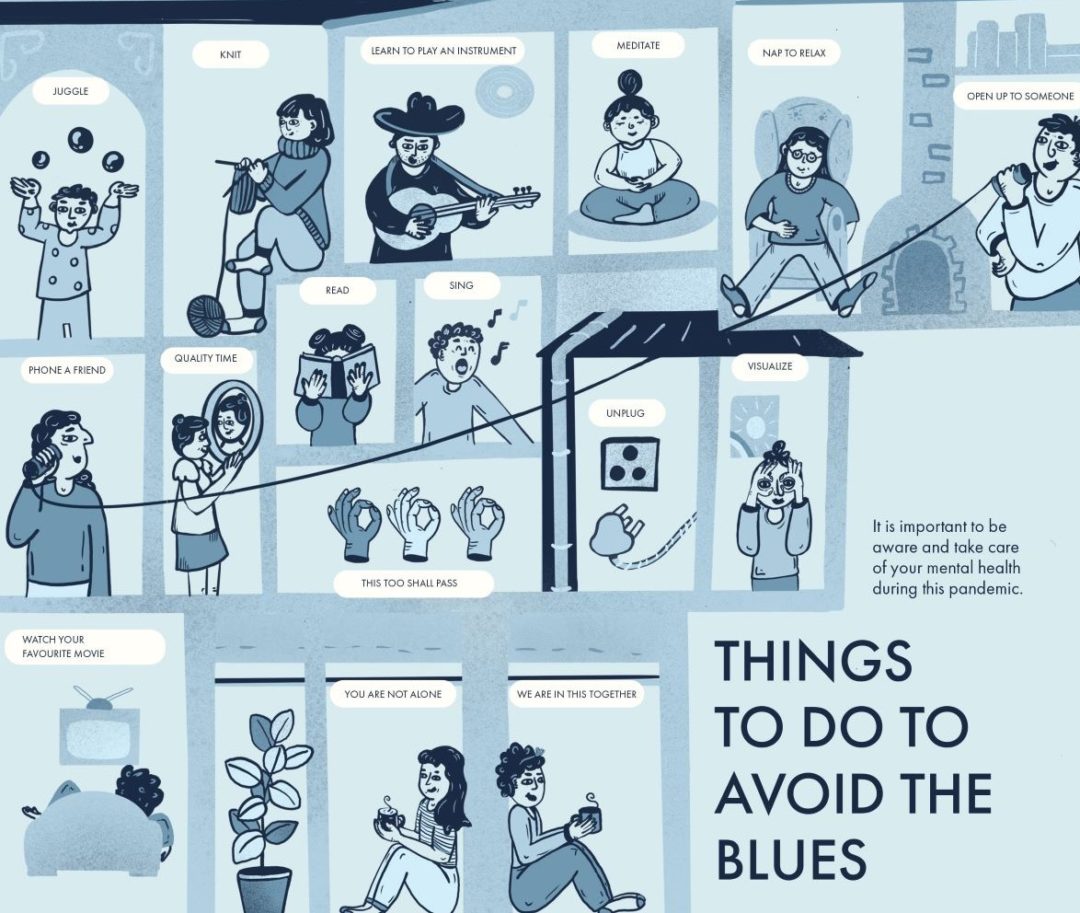COVID-19: Self-Care and What You Can Do
Categorized as: About us, Education, Grantee, Leadership, Our Partners, Stories, Storytelling on May 2, 2020.

Photo courtesy of the United Nations COVID-19 Response on Unsplash.
Editor’s Note: Last week we had the honor of hosting a Zoom meeting with several of our nonprofit partners to touch base with them and provide a forum for them to meet each other and talk about how their organizations are doing, how they are personally doing, lessons they are learning, and challenges they are facing.
There were several overlaps in our discussion: How to virtually connect with the people they are serving when those people don’t have internet access; how to fundraise during a pandemic; how to make sure they and their team, as well as those they are serving, are taking care of themselves and their mental health; how to approach investors, specifically large investors, to un-restrict their grants.
We decided to put together a little blog series on some of the ideas that were generated, and sources that might help answer some of these questions during this time. I hope it’s helpful for all you readers, as well. This week: Mental health and self-care!
 By Brienne Skees, Program Officer and VP of Research and Data Management
By Brienne Skees, Program Officer and VP of Research and Data Management
One of the most important things that we need to remember is to take care of ourselves. Our mental health and our well-being are vital for us to get through this. However, as most advice goes these days, this is much easier said than done. There are a lot of sources out there on how to cope, and we’ve dug through some of them in order to offer a bit of guidance.
Boosting Your Well-Being
First, here is a video by Nataly Kogan with some extremely helpful tips on things you can do for yourself, your family, and your coworkers–really anyone around you. This was one of the most useful videos I have seen that provides small actions we can take to keep a healthy perspective and remain optimistic. While I highly recommend you watch the full video, here are some highlights:
- Uncertainty causes more stress for your brain than knowing for certain something terrible will happen. This is because our brains are constantly trying to keep us safe, and having something unknown doesn’t allow your brain to problem-solve, therefore generating more stress.
- Acceptance is the first step in coping with this stress. Acceptance is a skill of looking at how you are feeling and how things are with clarity, and then asking yourself what you can do. Many people feel that when you allow yourself to feel negative emotions, you will get stuck in those emotions, but research shows exactly the opposite is true. When you actually let yourself feel your emotions, you feel them with less intensity and for less time. You should acknowledge your emotions, as that brings them forward for analysis rather than stifling them and allowing them to get out of control. It’s okay to not be okay. Once you have acknowledged and felt your feelings, you should think about one small thing you can do that will help you feel a little bit better. This will then motivate your brain to come up with more and more ideas on how you can survive this, which will help you stay grounded and productive.
- Gratitude is the next step. Gratitude is zooming in on something good in your life. We all know that gratitude is a healthy emotion, but in order to get the benefits of gratitude, you have to intentionally practice it. It is the shortest path to joy, and it is an essential source of resilience. You don’t have to be committed to being unhappy just because things aren’t perfect–you can allow yourself to experience joy and enjoy small things, even if it feels like you are “cheating on reality.” Studies show that even the act of thinking about something good in your life generates serotonin and makes you happier. You should give yourself the opportunity to feel your gratitude, and you should share it with those around you.
Staying Productive While Working From Home
Second, here is a blog provided by Foundant with some tips on working from home, and how you can maintain a healthy, productive routine if this is new for you. Here are some highlights:
- Create a workspace that is different from where you would usually spend a significant amount of time. This helps your body adapt to this semi-permanent change and adjust it to work-mode.
- Keep a daily routine. It will help you stay productive and motivated.
- Maintain work relationships. Get on a video call frequently and check in with each other. These connections are easy to set aside and shift purely to email, but maintaining these relationships if very important.
- Be cognizant of your family distractions. Working from home isn’t just an adjustment for you, it’s also an adjustment for those around you. Talk to your family and create boundaries for your work day.
This webinar recording shows us how to maintain human connections and stay productive while working from home. Again, here are some highlights:
- Acknowledge that this is not business as usual. While we aren’t all in the same boat, we’re in the same storm. This is a crazy time for everyone, and acknowledging that is helpful.
- Invest in productivity and comfort. Take what you need from your office, and provide your workers with the tools they need to be productive and happy. Provide them training on how to work from home, things to be aware of, and practices to keep their work secure.
- Create a permanent, professional workspace with signals to those around you (your family) indicators for when you’re working and when you’re not. This will help you keep a schedule and stay in work-mode.
- Take time to understand the situations of your coworkers and the working environments that they are in. Your coworkers might need to home-school their children, they might have a spouse also working from home, etc. Be understanding and give your coworkers a bit of grace to do what they need to do.
- Make an effort to stay balanced. Balance how you are getting and giving information, whether through email, phone calls, or video calls. Also, try to balance the goals of the household you are in. Your spouse or friends have different work goals from you, and you have to communicate with them to make sure everyone is accomplishing their goals. Self-care has to be balanced, as well. Check in with yourself, think about what you need, and communicate those needs.
- Ask how others are feeling. It can be hard for people to express their emotions because everyone is struggling right now. But you could also send out a pulse survey while considering the ease of the survey, the information you’re gathering, the creativity of the type of questions you’re asking, and the safety and anonymity of your employees.
- Be connected during work time, but maintain a disconnect during your personal time. Setting work-time boundaries is important. Allow yourself to take your work hat off.
- Staying connected socially is great. You can host virtual birthday parties, happy hours, etc. Zoom specifically has break-out rooms which will allow you to talk to your coworkers on a personal and social level rather than just a work level.
- Lead by example. Be available, authentic, empathetic, and also be willing to be led.
Foundant has several other posts related to COVID-19 survival, some specifically for funders, if you have time to peruse!
Using Your EQ (Emotional Intelligence) to Gain Strength
As Six Seconds states, emotional intelligence is a learnable, measurable, scientifically validated skillset that fuels better effectiveness, relationships, wellbeing and quality of life — for adults and children. Six Seconds is an emotional intelligence network that provides individual support as well as group classes, all motivated to help you grow and practice emotional intelligence. You can learn about their model here. Several of their courses are currently discounted due to the pandemic.
Want More?
Whether you are in the funding sphere or nonprofit sphere, it is important to keep your mental health a top priority. It’s far too easy to let that slip with the plethora of other things going on, but if we can’t take care of ourselves, we can’t take care of others. Check in with yourself, with your family, with your employees, and with the people you serve.
If you would like more information or resources on how to stay mentally healthy during this time, or if you would like to be connected to a mental health professional for some individual or group counseling sessions, feel free to email us at [email protected]. We at Skees Family Foundation hope you are able to stay safe and healthy, and remember, it’s okay to not feel okay.
SHARE this story with your networks; see menu at top and bottom of page.
SUBSCRIBE! Like what you see? Click here to subscribe to Seeds of Hope!
